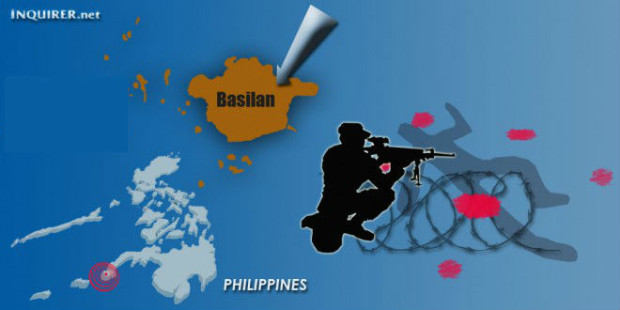Basilan-based Abu Sayyaf group (ASG) leader Furuji Indama is in critical condition following an encounter with Army soldiers that also led to the death of 18 government forces and at least 50 wounded, the military said.
Major Filemon Tan, spokesperson of the Western Mindanao Command, said on Monday that based on intel reports, Indama was critically wounded and eight more Abu Sayyaf members were killed after the Saturday fighting that left five militants dead, which included foreign terrorist Mohammad Khattab.
READ: Over 100 ASG bandits fought in Basilan clash
Indama has a multi-million bounty on his head and has been blamed for cases of murder and kidnapping.
Of the 20 wounded Abu Sayyaf members on Saturday, four died and another four were killed on Sunday’s intensified operations.
After the daylong gunbattle on Saturday that left the government with heavy casualties, Tan said the Armed Forces of the Philippines on Sunday has deployed six battalions, doubling its brigade-size force to go after Indama and Isnilon Hapilon, one of the Abu Sayyaf’s senior leaders.
Hapilon’s son, Amah, was also wounded (not Ubaida as earlier reported) from Saturday’s gunbattle.
Saturday’s fighting in Brgy. Baguindan in Tipo-Tipo was the biggest combat loss for the government in a single day this year. AFP spokesperson Brig. Gen. Restituto Padilla said the operations were long planned and was part of their continuing efforts to go after the Abu Sayyaf in Basilan.
“It just happened that the 44th Infantry Battalion encountered the Abu Sayyaf in an area where they are strongest,” he told reporters at Camp Aguinaldo.
Padilla explained that it was a “very close encounter” and some of the troops fought with the enemy at the distance of 10 meters.
Aerial bombardment was also delayed by a few hours because of poor weather conditions. Instead, the military used its alternate plan and doubled its artillery strikes, Padilla said.
“It was supposed to be both [aerial bombardment and artillery] if the opportunity and circumstances allowed. But since there was intervening factor of the weather the helicopters were not able to enter so we doubled our artillery preparatory fires,” he said.
Padilla denied reports that the troops on the ground lacked support, “All the equipment and assets they needed were at their disposal.”
Air support for the fighting that started at 8a.m. came by midday which prevented the Abu Sayyaf from closing in.
“When the weather cleared, the OV-10s came in and they launched fires the whole afternoon on Saturday and the enemies were not able to come closer,” Padilla said. JE


